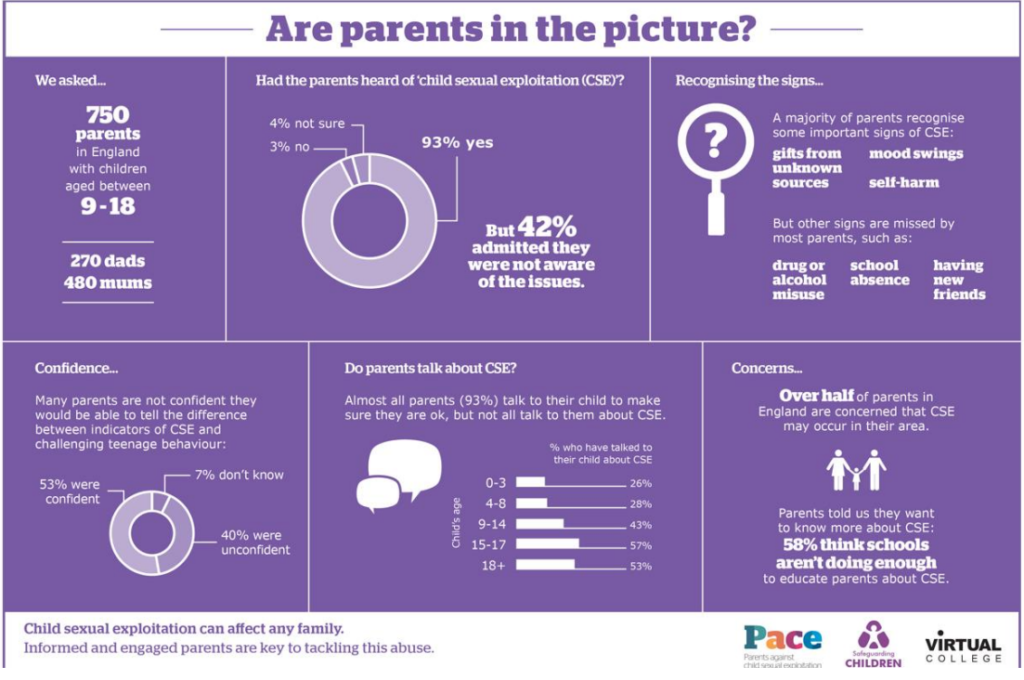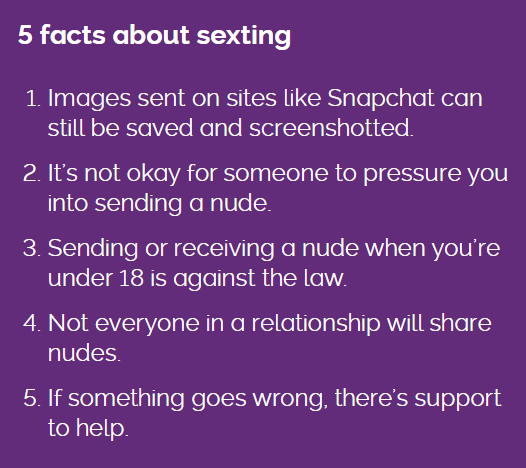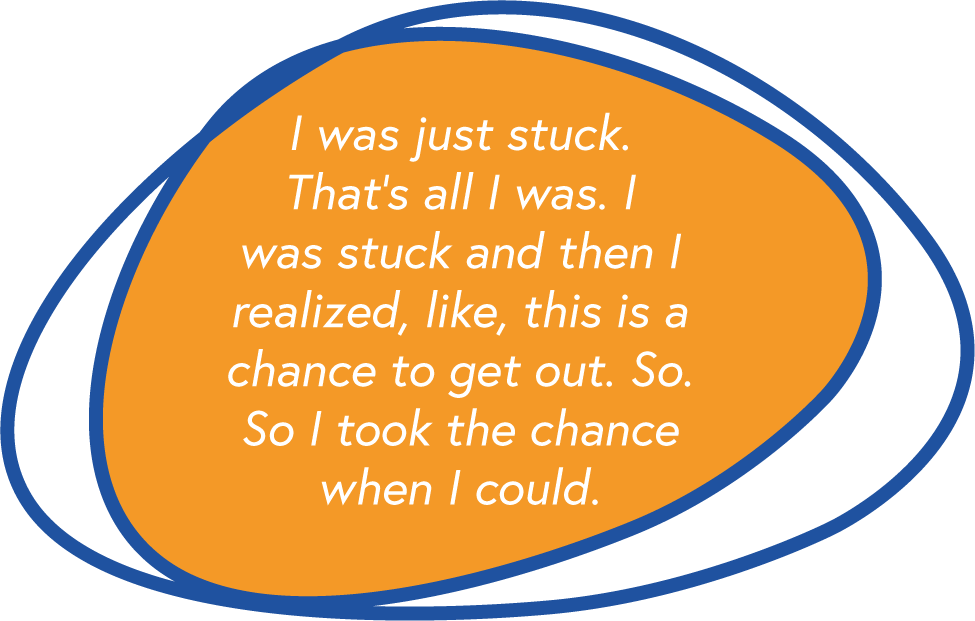How do I talk to my child about exploitation?
Have you ever talked to your child about keeping safe on the roads?
What about stranger danger?
Or keeping safe online?
As parents and carers we give our children key safety messages all the time – but have you ever talked to you child about child exploitation?
This is another issue that parents and carers need to Be Aware of and able to talk to their children about. Every year, thousands of children are forced into child exploitation; it is happening in our county and our best way to tackle this is to raise awareness of the issue.
A recent survey by Ivison Trust (formerly PACE) highlighted the issues with parents talking to their children about exploitation:

Early safety conversations:
As with any key safety discussions we have with children, it’s important to encourage normalising open conversation as early as possible so young people know that there are no ‘taboo’ topics that they can’t talk to you about. Talking about exploitation can naturally feel daunting, but key messages can be shared with your children early.
- Try to find a good time to start a conversation. Pick a time when your child’s relaxed and not distracted by something else (e.g. TV, phone, computer). You might want to have the conversation in a neutral place, such as on a walk or a bike ride, or even in the car, rather than somewhere at home where you might be interrupted.
- It can help to make the conversation relevant to something that’s happened recently. For example, if you’ve been watching a TV series or film where one of the characters is in a relationship. You could ask your child what they think about the character’s relationship and if it’s healthy or unhealthy. Or if your child’s been learning about sex and relationships education in school, you could ask them how they’re finding this or what everyone in the class thought about it.
- Try not to rush the conversation and let your child talk to you in their own time. It can help to have several short conversations rather than trying to cover everything at once – think ‘little and often’. If your child feels uncomfortable, let them know that you’re there if they want to talk to you about relationships at a different time.
Consent:
It’s important to talk to children and young people about consent. You can help them to understand that consent in any relationships is about feeling in control and saying yes or agreeing to things because you choose to, not because someone is pressuring you to.
When it comes to exploitation; this may provide children and young people with the skills and confidence to say no to situations early when something doesn’t feel quite right.
When talking to your children about sex, relationships and consent; here is an interesting analogy to start the conversation.
Healthy relationships:
Children learn so much from their peers and the internet these days about relationships. Most have easy access to inappropriate content (things like pornography) due to the devices they have. Try to talk to them about respect for boundaries in relationships, what is acceptable and what is not, what is normal and what is not.
These are sensitive and difficult areas to discuss with your child but as a parent and carer you will know the best time and place for these discussions. Remember although this can be a difficult subject to address, the offenders don’t find this difficult and the messages your child could be getting about relationships could be from them rather than you. Knowing the signs of when a relationship is unhealthy can help a child or young person identify if they are being exploited.
Remember – this can be any relationship your child has e.g. with a friend, boyfriend or girlfriend, or with an adult.
1) They’re really intense – They’ve got extreme feelings or really intense behaviour that you might find suffocating. Do they always want to see you and don’t want to see your friends? Do you think they’re a bit over the top? You should have your own space.
2) They’re jealous – We all get a bit jealous, but the problem is when they try and control you because of it. Are they getting upset when you get a message? DO they look through your phone? Are they really suspicious?
3) They’re manipulating you – Its not easy to spot, but do they ignore you until they get what they want? DO they try and get in your good books with gifts, and are always apologising?
4) They’re isolating you – Do they get annoyed if you don’t spend all your time with them an want to spent time with your friends? Do they make you question your family and friends? Are you becoming reliant on their money, or even their attention?
5) Making you feel bad, but then saying its a joke – It’s not on if they make rude comments about you and your family, including what you look like. Even if they say it’s a joke, it’s not funny.
6) Threatening to make you look bad – They could start a rumour, or threaten to share private information about you, or even stop you getting things done; like school work.
7) Making you feel guilty – Making you feel like everything is your fault, and their happiness relies on you. They could threaten to hurt themselves if you don’t stay with them. DO they guilt you into having sex?
8) They fly off the handle – Are you walking on eggshells because they might go off on one. Does it make you feel frightened?
9) Acting differently around people – Do they act differently with other people than when they’re with you?
10) They don’t accept the blame for their behaviour – They blame you, or blame someone else, like mental health problems or what’s happened to them before. It makes you feel guilty.
Keeping safe online:


Have discussions about how real the messages we see online are. You could open discussions with them about what they read or post and does this always reflect reality? Have them think about what other people are posting. Is this reality or are they pushing image’s they want you to buy into? Discuss glamorisation of violence, drugs and misogyny in the music and posts online. Having these discussions helps children have counter messages to the ones they are often surrounded by online and in peer groups.
Talking about healthy online relationships can help develop a shared understanding, build trust and support between you. www.Thinkyouknow.co.uk have developed a campaign #asktheawkward which prepares parents and carers to have regular conversations with their child about online relationships and related topics. It also offers advice on how to keep conversations positive and what to do if your child tells you something that worries you. For more information click here.
The Internet Watch Foundation have also developed the TALK checklist to help keep your child safe online.
- T: Talk to your child about online sexual abuse. Start the conversation – and listen to their concerns
- A: Agree to ground rules about the wat you use technology as a family
- L: Learn about the platforms and apps your child loves. Take an interest in their online life
- K: Know how to use tools, apps and settings that can help keep your child safe online.
To download a full copy of the checklist click here: Parent_Resource_UpdatedJuly2023.pdf (iwf.org.uk)

Sexting is when you send a sexual message, photo or video to someone else. It could be a picture of you, but sometimes people send pictures and videos of other people.
Young people can often be groomed online and manipulated into sending inappropriate images, which can then be used to blackmail and manipulate young people into child sexual exploitation.
Childline have lots of information on talking to your children about sexting and sending inappropriate images: Click on the image below to find out more: 
Further information about talking to your children about online safety can be found at www.nspcc.org.uk or in our online safety section:
Talking to your child when you are worried:
One of the most difficult things about discovering that your child or a child that you care for has been, or is at risk of being exploited is broaching the subject with them. This can be especially difficult if the offender has tried to turn your child against you, breaking apart a once close relationship.

Above all else, make sure you tell your child that, whatever has happened, it’s not their fault, that you believe them and that you are on their side. Listen to your child, don’t judge them. Be consistent with this message, young people may need to hear this message repeatedly.
Think about how you will bring up the subject and what you want to ask. It’s also worth thinking about how your child might react to your questions and what you will do or say to reassure them.
Pick a private, quiet place where you won’t be interrupted or overheard. A place where your child can say as much or as little as they like or get as upset as they want, without feeling like anyone else is watching or listening.
Child exploitation is a hugely upsetting subject, but try to stay calm when talking to your child. It could make a big difference to how much they do or don’t tell you.
Make sure your child knows exactly what you’re asking them but be gentle about it. Avoid questions that might feel too personal such as ‘What happened?’ and instead focus on how they are feeling now.
Terms like ‘sexual exploitation’, ‘manipulate’ and ‘coerce’ might go over your child’s head. So try to use simpler terms that they’ll understand. For example, ‘keeping safe’, ‘trick’, ‘force,’ or ‘take advantage of’. Head over to our Jargon Buster for more information about language.
If a child tells you they have been exploited:

Finding out that your child is being or has been exploited is extremely traumatic. You might find yourself in shock or in denial. You might feel angry, guilty, upset, confused, scared, embarrassed, annoyed, helpless and depressed. These feelings and reactions are normal and understandable. PACE have shared an article about living and coping with child exploitation which can be accessed here.
Below are some tips about what to do if a child shares with you they may have been exploited.
Be patient and focus on what you’re being told. Try not to express your own views and feelings. If you appear shocked or as if you don’t believe them it could make them stop talking and take back what they’ve said.
If they’re struggling to talk to you, show them Childline’s letter builder tool. It uses simple prompts to help them share what’s happening and how they’re feeling.
Reassurance can make a big impact. If they’ve kept the abuse a secret it can have a big impact knowing they’ve shared what’s happened.
Abuse is never a child’s fault. It’s important they hear, and know this.
They may have kept the abuse secret because they were scared they wouldn’t be believed. Make sure they know they can trust you and you’ll listen and support them.
Confronting the alleged abuser could make the situation worse for the child.
For younger children, explain you’re going to speak to someone who will able to help. For older children, explain you’ll need to report the abuse to someone who can help.
Report as soon after you’ve been told about the abuse so the details are fresh in your mind and action can be taken quickly. It can be helpful to take notes as soon after you’ve spoken to the child. Try to keep these as accurate as possible.







 View all our news
View all our news